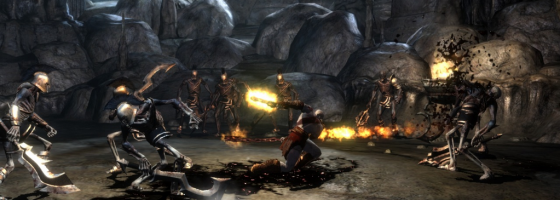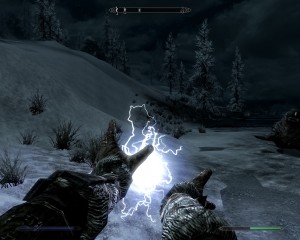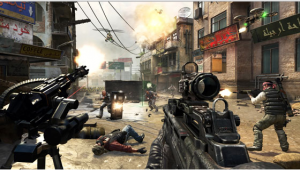Trending
Opinion: How will Project 2025 impact game developers?
The Heritage Foundation's manifesto for the possible next administration could do great harm to many, including large portions of the game development community.

Featured Blog | This community-written post highlights the best of what the game industry has to offer. Read more like it on the Game Developer Blogs or learn how to Submit Your Own Blog Post
In this reprint from Game-Wisdom, RPG mechanics and systems have been seen in more genres over the last decade. And the spread of this design has made classifying RPGs a challenge.

(Reprinted from Game-Wisdom)
RPGs are a fascinating genre to analyze: it's one of the oldest genres on the market, not limited by platform and has a huge variety of designs. But what I find interesting is how the mechanics and systems of the genre have spread and thrived in completely unassociated genres.
While replaying Odin Sphere, a question popped into my head that has been asked countless times: "What is a RPG?" And while many of you will be quick to answer, there is more to examine under the surface.

God of War, originally posted on destructoid.com
From the 80s to the majority of the 90s, action and RPG titles were completely separated by how much actual control the player had in the game. The definition of abstraction can vary based on what we are talking about, but for video games we can say the following:
Abstraction: Breaking down a complex action into an easier represented event.
When you play a RPG like Baldur's Gate, your actual input doesn't matter in terms of controlling the character's actions. I couldn't press the arrow keys to control how a character bobbed and weaved to avoid sword slashes or correctly timed the raising of a shield. Instead, the character's attributes and armor value factored into the abstracted results of combat.
On the other hand, there is very little abstraction when you are playing an action game like Devil May Cry. You are in complete control of Dante's offensive and defensive capabilities: There are no dice rolls or stats to affect whether you win or lose.
Segmented design between genres was the status quo for much of the 80s and 90s. But starting from the early 00s, the wall started to break down and in the process, made the determining qualities of a RPG harder to spot.
Going back to Odin Sphere, the player had complete control over attacking and dodging as in an action game. However, the player's health points and attack strength were based on two different abstracted leveling systems.

Skyrim
RPG mechanics can be seen in everything from Skyrim...This kind of combination of action and abstracted systems was the basis of the Action RPG or ARPG sub-genre.
Now, going back to the original question: What is a RPG? Chances are that most of you responded with something along the lines of a game that uses abstracted systems.
But if we just leave it at that, then that actually opens up the door and allows me to say the following crazy statement:
God of War and Call of Duty are as much a part of the RPG genre as Dragon Age and Skyrim.
In my article: The Abstraction of Skill in Game Design, I talked about how the degree of abstraction in game systems over the last decade has made action games more RPG-like and RPGs more action-like.
This in turn has lead to games like Borderlands which was a first person shooter with RPG abstractions of leveling and weapons. Or Dark Souls which was a stat influenced abstracted RPG with player involved movement and attack.
Because of the change of genre conventions and design, we can create a new definition for the RPG genre and abstraction:
RPG: A game built on player-influenced abstracted systems.
The term "player-influenced" is important as it provides a way to distinguish game designs. Just saying the term "abstraction" is not specific enough, as every video game ever made has some level of abstraction built into it.
No one questions why Mario jumps so high or Nathan Drake can be that accurate with a variety of weapons. Since the designers abstracted the concepts to make the titles more appealing.
However player-influenced abstraction means that the player has control of the abstraction at play based on their actions and choices. In a pen-and-paper RPG, the designers described the act of leveling as the person through training and continued use becoming better.
In other words, a swordsman would become more comfortable swinging a sword and could better use it for more powerful swings, not that their sword attacks magically did more damage after leveling up.

Call of Duty, originally posted on polygon.com
...To the leveling systems and upgrades of Call of Duty multiplayerGoing back to God of War, by collecting red orbs the player could distribute them to a number of Kratos' abilities.
As time went on, the player would do more damage with his blades of chaos, not because they were hitting the button harder but because of the abstraction of leveling up the weapon.
Also by using the term “player-influenced abstraction" we can also rule out certain games. Team Fortress 2 for all the items, hats and weapons available would not be considered a RPG in any aspect. As while there was plenty of abstraction at work, all of it was not controlled by the player. My heavy without items will do the same damage and have the same chance at critting as everyone else's heavy.
Another example would be The Binding of Isaac, while the game offered the player a huge variety of items that greatly affected the experience; none of them were actually influenced by the player. In the sense that the player could not control the upgrading/downgrading of items.
Regarding my article, it's important to remember that adding more or less abstraction based on the genre doesn't create "the perfect game." There are plenty of action gamers who don't want to have to grind experience and RPG gamers who don't want to button mash their way to victory.
The spread of RPG mechanics has been interesting and in the right design can improve the respective titles. Yet even with the spread, we still have a number of RPGs that continue to refine and build new mechanics.
As more RPG designers borrow elements from different genres it will be interesting to see how the once rift between JRPG and CRPG design will change. And if that means that we'll see more games that push the definition of a RPG then I'm all for it.
Read more about:
Featured BlogsYou May Also Like